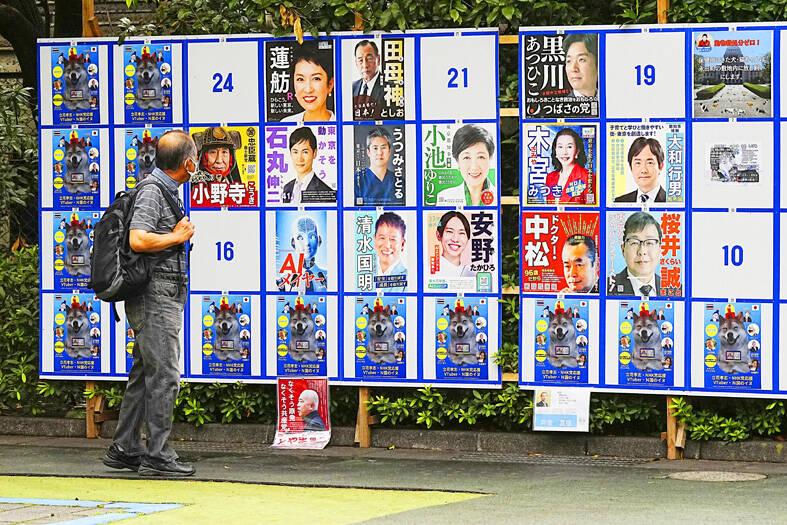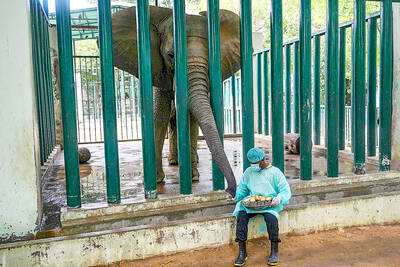Tokyo is holding elections for a new governor tomorrow, but residents say personal publicity stunts have overtaken serious campaigning to a degree never seen before, with nearly nude women in suggestive poses, pets, an artificial intelligence (AI) character and a man practicing his golf swing.
It is impossible to ignore. With Internet campaigning still relatively new, candidates traditionally use designated election billboards — more than 14,000 of them — to promote themselves. The makeshift billboards are set up only during the short campaign season and are valuable space for exposure in a city already crammed with advertising.
However, this year’s wackiness — notably from non-candidates renting the billboard space — is proving exceptional, and residents have flooded election offices with angry calls and messages.

Photo: AP
“They are distasteful. As a Japanese citizen I feel embarrassed, as I see many foreign visitors pass by those billboards and they must wonder what’s going on,” said Mayumi Noda, an office worker. “As a voter, I think it’s outrageous and disrespectful to the other candidates who are seriously competing.”
FRINGE FIGURES
A record 56 candidates, including incumbent Governor Yuriko Koike, who is seeking a third four-year term, are running. Many of the candidates are fringe figures or influencers seeking even more exposure.
Tokyo, a city of 13.5 million, has outsized political and cultural power in Japan. Its budget equals that of some nations, and its policies impact the national government.
Hours after official campaigning began on June 20, residents faced a stunning array of posters. For some, it is not even clear whether the person behind it is a candidate or simply seeks exposure.
One billboard featured racy posters for an adult entertainment shop. Another had an almost naked female model in a suggestive pose with a message that said “Stop restricting free speech.” Others showed photos of a pet dog or a female kickboxer. One candidate called AI Mayor used an image of a metallic humanoid.
Campaign video clips have also drawn criticism. One shows female candidate Airi Uchino saying: “I’m so cute; please watch my campaign broadcast,” and repeating her name in a high-pitched, anime-style voice while asking voters to be friends on social media. She then strips down to a beige-colored tube top.
In another video, a male candidate who represents what he calls a “golf party,” talks about his policies while occasionally practicing his golf swing.
Under a 1950 public office election law, candidates in Japan are free to say anything, as long as they do not support another candidate or carry obviously false or libelous content.
This year’s escalation is partly linked to an emerging conservative political party that has fielded 24 candidates for governor. Since each of the election billboards across Tokyo has 48 squares for candidates to paste their posters, the party is renting out half the slots to anyone who pays, including non-candidates.
That kind of unexpected approach is not regulated.
FOR RENT
The rental cost starts at ¥25,000 (about US$155) per location per day, party leader Takashi Tachibana said.
“We have to be wacky or we don’t get media attention,” Tachibana said in a YouTube comment posted on the party Web site.
“The point is to make immoral and outrageous actions ... to get attention,” said Ryosuke Nishida, a Nihon University professor and expert in politics and media. “The reason why some people find these performances amusing is because they think their objections are not taken into consideration by politicians and existing parties or reflected in their politics.”
At a park near Tokyo’s busy Shimbashi train station, passersby glanced at a campaign billboard with half of its slots filled with dog posters.
“I don’t decide who to vote for by looking at the faces on their posters,” said Kunihiko Imada, a plumber. “But I still think these billboards are being misused.”

NO EXCUSES: Marcos said his administration was acting on voters’ demands, but an academic said the move was emotionally motivated after a poor midterm showing Philippine President Ferdinand Marcos Jr yesterday sought the resignation of all his Cabinet secretaries, in a move seen as an attempt to reset the political agenda and assert his authority over the second half of his single six-year term. The order came after the president’s allies failed to win a majority of Senate seats contested in the 12 polls on Monday last week, leaving Marcos facing a divided political and legislative landscape that could thwart his attempts to have an ally succeed him in 2028. “He’s talking to the people, trying to salvage whatever political capital he has left. I think it’s

Polish presidential candidates offered different visions of Poland and its relations with Ukraine in a televised debate ahead of next week’s run-off, which remains on a knife-edge. During a head-to-head debate lasting two hours, centrist Warsaw Mayor Rafal Trzaskowski, from Polish Prime Minister Donald Tusk’s governing pro-European coalition, faced the Eurosceptic historian Karol Nawrocki, backed by the right-wing populist Law and Justice party (PiS). The two candidates, who qualified for the second round after coming in the top two places in the first vote on Sunday last week, clashed over Poland’s relations with Ukraine, EU policy and the track records of their

UNSCHEDULED VISIT: ‘It’s a very bulky new neighbor, but it will soon go away,’ said Johan Helberg of the 135m container ship that run aground near his house A man in Norway awoke early on Thursday to discover a huge container ship had run aground a stone’s throw from his fjord-side house — and he had slept through the commotion. For an as-yet unknown reason, the 135m NCL Salten sailed up onto shore just meters from Johan Helberg’s house in a fjord near Trondheim in central Norway. Helberg only discovered the unexpected visitor when a panicked neighbor who had rung his doorbell repeatedly to no avail gave up and called him on the phone. “The doorbell rang at a time of day when I don’t like to open,” Helberg told television

A team of doctors and vets in Pakistan has developed a novel treatment for a pair of elephants with tuberculosis (TB) that involves feeding them at least 400 pills a day. The jumbo effort at the Karachi Safari Park involves administering the tablets — the same as those used to treat TB in humans — hidden inside food ranging from apples and bananas, to Pakistani sweets. The amount of medication is adjusted to account for the weight of the 4,000kg elephants. However, it has taken Madhubala and Malika several weeks to settle into the treatment after spitting out the first few doses they